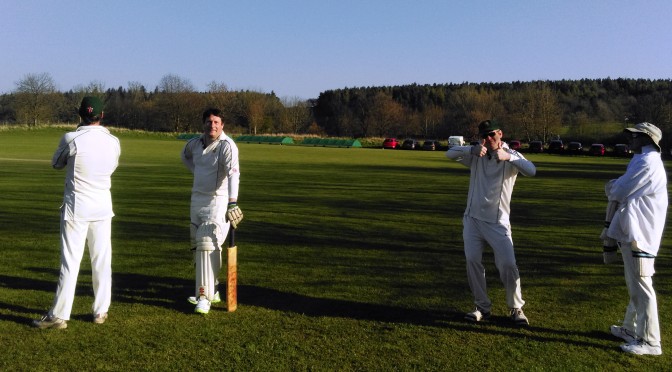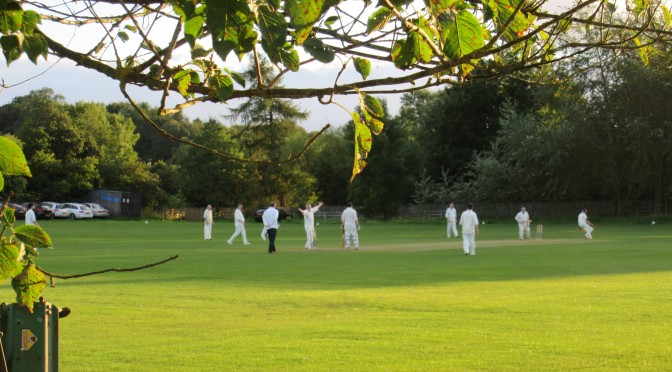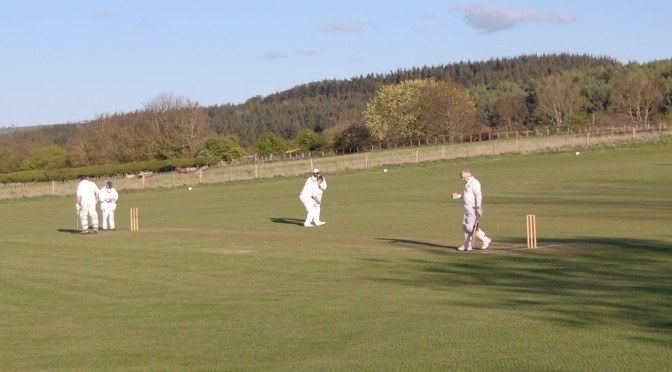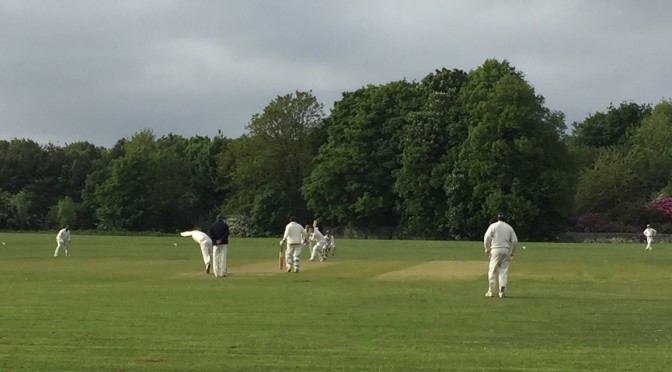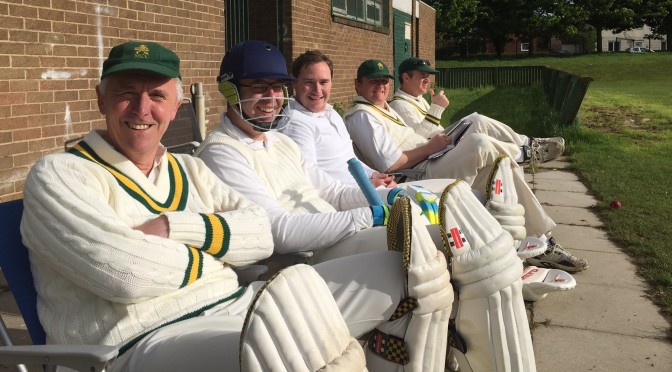Sometimes rare and beautiful things happen. Sunshine breaks out on what has been a pretty worse than average wet summer, a full-strength Mallards squad turns up on time and Architects turn up 3 men short and without their big hitters. A collective sense of optimism that momentous things just might happen was in the air.
An examination of the pitch from the club-house using high-powered binoculars indicated that the match was to be played from the strip closest to St Barnabas church and graveyard. In fact a two-minute walk to get closer to the strip suggested that the groundsman had possibly and cheekily found an additional strip just adjacent to the square. Just to make things more interesting the square boundary to the clubhouse side had not been brought in, making the distance to hit a ball somewhere of the order of 110m (or 120 yards in old money) – albeit on a fast outfield. Was an all-run 5 on the cards? In contrast, the far-side boundary was just about perfect for the square-leg umpire to stand and comfortably view proceedings from.
Skipper Butcher won the toss and despite being reminded of memories of last year’s 106-run drubbing, chasing 204 to win, elected clemency on the Architects’ lads, who were hoping for late arrivals, and invited them to bat.
Browne and Bennett were given the dubious pleasure of opening the bowling, the former all the time muttering about retiring and being put out to grass (the lawn variety one would hope). While openers Loach and Brown (without the ‘e’) got off to a good start, Bennett made the first breakthrough in the fourth over removing Brown with a plumb back-foot lbw, to leave the score on 22-1. Browne, no doubt inspired by his fellow opener, saw no. 3 Brigham Snr lbw for a duck the following over. However the batsmen dug in and steadily made their way to see the score at 47 for 2 at the end of the 8th over, Browne finishing with a respectable 1 for 24 for his allotted 4 overs and Bennett 1 for 18 off his, figures that might have been better if the skipper’s fine catch at backward square leg hadn’t been ruled out for a no-ball.
Captain Stig, wheeled the bowling changes with Benson coming in from the main road end and Dunhill from the tennis courts end. Dunhill (complete with knotted handkerchief headwear) had a tidy first over, but Benson wasted no time after taking a few balls to settle in by bowling opener Loach for 16. Benson also struck in his second over, thanks to a well-taken catch on the cemetery boundary by Wood to remove the dangerous Brigham Jnr for 21. The bowling and fielding remained tight and scoreboard pressure was starting to mount for the Architects batsmen who did not seem able to make good use of the available boundary just 30 or so meters away. Dunhill finally got some reward in his final over to remove Harkin for 7 to finish with 1 for 15 off his 4 while Benson had an expensive last over to finish with figures of 2 for 28 for his 4.
At this point, Captain Butcher suddenly realised that he still had 4 overs to bowl and not many bowling options left. Steel could be seen to be wilfully looking the other way and the captain seemed reluctant to give his own arm a whirl. So it came to looking to his nowadays part-time options of Taylor and Wood. Determined to show the Mallards “youth” how it should be done, Taylor promptly took a caught and bowled from a dipping full toss, while Wood after conceding a four (dropped and thrown over the boundary by his captain!) promptly took the last 2 wickets in consecutive balls in complete scorn of the friendly agreement to play last man standing. The end of the innings saw Architects slide from 91 for 5 to 101 all out in just 15 balls and two and a bit overs short of their allotted 20.
The Mallards reply saw Kent and Steel take to the crease and two Mallards players take to the field to augment the Architects VIII. There was a look of determined aggression in Kent’s eye, which may have had something to do with childminding difficulties that could have seen him returning home with one less child than he arrived with. That aggression took very little time to manifest with the second ball of the innings driven for 4. However the opening bowling partnership of Lawson and Smith was tidy and at the end of the 6th over the score was 30 for 0 and (admittedly faint) cries of “get on with it” were given short shrift with an angry wave of the bat from Kent.
The 7th over saw the first bowing change with Harkin replacing Laughton. With Kent largely hogging the strike, Steel was largely content to play the anchorman role especially when Brigham Jnr was brought on to replace Smith, and started to bowl some deliveries at a lively pace that Kent seemed content to let Steel face. However, runs continued to flow, an experimental over from Brown proved to be particularly productive for Kent including a big hit that saw the ball rattle bagatelle-like through the huge tree that overhangs the ground from the cemetery.
With the score on 86, Kent hit yet another 4 to a cheer from the distant boundary indicating that he had passed 50 runs (52 in fact). At which point, despite no retirement being agreed, Kent elected to protect his average and promptly did so – judging that 12 runs in 5 or so overs with the quality batting line-up still to come would be a stroll in the park, the openers having put on a majestic 90 runs.
Now you may be thinking at this point was the rare and beautiful thing going to be Mallards winning a game without losing a wicket? Think again! I have to confess at this point the order of proceedings is a bit hazy owing to the fact that the book (yet again) has not been filled in correctly – a black mark to the Skipper. With the talismanic Kent retired, Steel (obviously pining for his batting partner) was out caught by Brigham Jnr off the bowling of Brigham Snr. Greenwood came and went for a duck. Porteous, allegedly on a batting roll was bowled by a fully pitched-up, late-inswinging beauty from Brigham Jnr that saw his middle stump removed. Butcher in at 5 was bowled by Harkin for 1 and Taylor, having only just managed to get off the field from umpiring duties and barely in his pads was back on to bat – sadly not very long as he skied his 4th ball to be out for 1.
So yes, Mallards had gone from 90 for 1 to 97 or 5 and only 12 balls left in the game. Was the prospect of snatching defeat from jaws of victory on the cards? Thankfully no. Wood, who had now been joined by Bennett, in at no. 8, hit a four to the cemetery boundary to ensure the scores were level. At the start of the 19th over it was Bennett on strike. Calmly he took one ball to steady his nerves before driving the next to the long-on boundary and a famous victory.
It’s not often that Mallards beat Architects at their home ground, in fact the last time we may have done so was with all three Mollers in the squad – so you are talking about 8-10 years ago. OK, so they were missing a couple of their big hitting players, but those that turned up were all decent cricketers, so we’ll take the win, particularly as it was our turn to take advantage of their pernicious ‘no retiring’ rule. The lure of Germany v. France on the screen in the clubhouse bar was of no appeal to the Mallards lads who took that rare and beautiful opportunity to celebrate victory on the benches outside on a lovey sunny evening.


